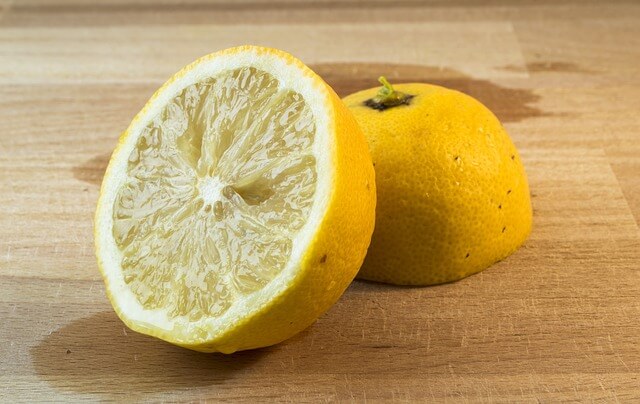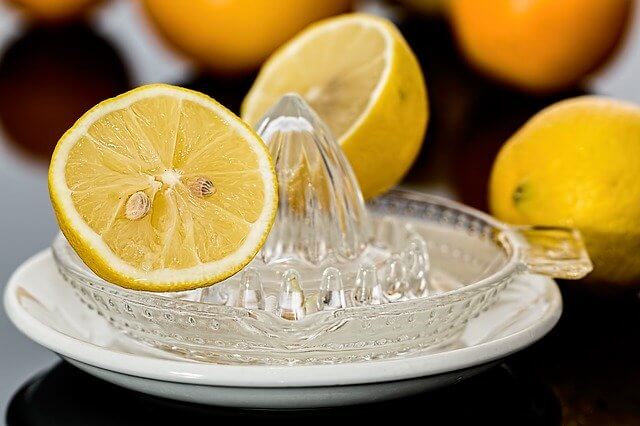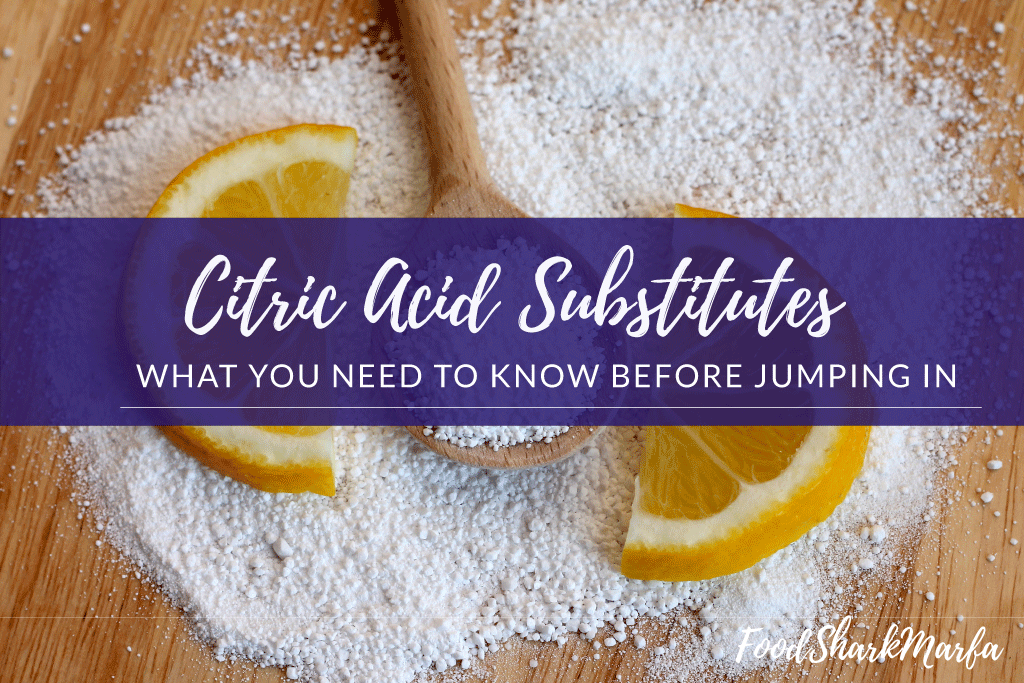One of the top choices for dishes that need a weak acidic ingredient to jazz things up is citric acid. It is commonly used to preserve canned foods, desserts, and beverages. It also works well with milk to activate pectin, so it can be used to create jams and some types of cheese. When it is called for in a recipe, leaving it out without finding an adequate substitute simply isn't an option. This is why having an awareness of what citric acid is all about and what substitutes work best in its place is crucial for any cook.
What is citric acid?

Citric acid is a substance that is naturally found in certain fruits of the citrus variety, such as limes and lemons. Citric acid is what makes these fruits sour and tart to the taste. There is also a manufactured form of citric acid that is used as an addition to cleaning agents, nutritional supplements, and certain types of foods.
Citric acid was first produced from lemons in Sweden in 1784. The colorless and odorless component was also made from lemon juice into the 1900s when it was realized that it could be created from black mold. As an ingredient with a sour and acidic taste, it’s commonly used as a flavoring and preservative and is often used in candy and soft drinks.How healthy (or unhealthy) is it?
You may be wondering whether citric acid is healthy, and you can be assured that it is. Citric acid is capable of allowing your body to absorb minerals much more effectively than it can otherwise. Also, some forms of citric acid can help break apart kidney stones or even prevent them from forming in the first place. Citric acid also helps create chemical reactions that take the food you consume and turn it into energy that enables you to get through the day.
Nutritional Breakdown
Citric acid | Amount (per 100 g) | % Recommended daily intake |
Calories | 0 kcal | 0% |
Total fat | 0 g | 0% |
Saturated fat | 0 g | 0% |
Carbohydrates | 0 g | 0% |
Cholesterol | 0 mg | 0% |
Salt | 0 mg | 0% |
Protein | 0 g | 0% |
Calcium | 0 mg | 0% |
Vitamin B-12 | 0 ug | 0% |
Potassium | 0 mg | 0% |
(Based on nutritional information from USDA.)
What recipes use citric acid?
If you’ve ever looked over the ingredients on a snack wrapper or a soft drink can, you may have seen citric acid listed. That’s because it can preserve all sorts of foods made commercially. It can also be used to preserve things like canned fruits. Since it is an acid, it works well with many flavor profiles, including bitter, sweet, umami, and salty.
One of the most popular cooking choices that use citric acid is the creation of cheese, such as paneer and ricotta. It also adds a punch of tart lightness to many dishes that may be too rich without the use of an acid. Other recipes that can be made with citric acid include a variety of soups, cabbage rolls, and margaritas. It can also be used in some bread recipes to add a bit of a tang to the final product.Why do we need citric acid substitutes?
If you do not have access to citric acid or prefer to work with ingredients that are more familiar to you, having a citric acid substitute is a must. Sometimes it can take a bit of time and effort to purchase citric acid, and for a recipe that you want to make immediately, it’s best to have other options at hand. When you find yourself creating a meal that calls for citric acid but you don’t have any in stock, the four substitutes below can provide you just what need without chasing down the more traditional ingredient.
Note:
🌱 = vegan
1. Lemon juice🌱
Best for: desserts, beverages, sauces, pasta, and stir-fry.

Overview
One of the top citric acid substitutes, and an option you might have in your kitchen right now is nothing more than lemon juice. It contains a large amount of citric acid, as well as the sour flavoring that distinguishes this type of acid. Lemon juice can come pre-packaged, or you can make your own by squeezing the juice out of a few lemons. The second choice also comes with the ability to enjoy a fresh ingredient that you can make in just a few minutes.
Advantages
Something that lemon juice offers that citric acid does not is an elevated level of nutrients, including vitamin C. Depending on the size of the lemon, it will provide around three grams of citric acid on average. Since lemon is a source of citric acid, it works well in most recipes that call for the primary ingredient.
Disadvantages
Of course, no ingredient is entirely the same as citric acid, even if they have numerous factors in common. Citric acid typically comes in a powdered form, while lemon juice is a liquid, so you may need to make slight adjustments to your recipe if you want the end result to be as similar as possible. The best way to handle this situation is by cutting down on other liquids in your recipe so it doesn’t come out overly runny.
Nutritional breakdown
Lemon juice | Amount (per 100 ml) | % Recommended daily intake |
Calories | 0 kcal | 0% |
Total fat | 0 g | 0% |
Saturated fat | 0 g | 0% |
Carbohydrates | 0 g | 0% |
Cholesterol | 0 mg | 0% |
Salt | 0 mg | 0% |
Protein | 0 g | 0% |
Calcium | 0 mg | 0% |
Vitamin C | 24 mg | 1% |
Potassium | 0 mg | 0% |
2. Vitamin C tablets🌱
Best for: seasoning salts, flavoring powders, crunchy snacks, and jams.
Overview
Vitamin C tablets are another great option for substituting out citric acid when you don’t have any in your kitchen. These tablets are typically vegetarian or vegan, and most are also sugar-free, gluten-free, and lactose-free, so they meet many specific dietary requirements. If you already have a bottle of them around the house, they can easily be used to create a citric acid substitute that you might not have considered otherwise.
Advantages
When using vitamin C tablets instead of citric acid, you will still experience dishes with a sour taste and a bit of tanginess. You can also substitute them in a one to one ratio, which makes it easy to use them in your recipes. Not only do these tables offer the same taste as citric acid, but they also provide a dose of ascorbic acid, which is another acid that is found in citrus fruits.
Disadvantages
Vitamin C tablets do not contain citric acid, so you need to be open to using a different type of acid in your dish if you choose this substitute. Also, there is some preparation required to make them ready to add to a recipe. Instead of slipping a few tablets in whole, you'll need to crush the vitamins down before you add them to a dish. Also, this substitution may not be the ideal choice for more complex recipes.
Nutritional breakdown
Vitamin C tablets | Amount (per 100 tablets) | % Recommended daily intake |
Calories | 191 kcal | 9% |
Total fat | 0 g | 0% |
Saturated fat | 0 g | 0% |
Carbohydrates | 50 g | 18% |
Cholesterol | 0 mg | 0% |
Salt | 0 mg | 0% |
Protein | 0 g | 0% |
Calcium | 0 mg | 0% |
Vitamin C | 67500 mg | 3375% |
Potassium | 0 mg | 0% |
3. Vinegar🌱
Best for: dressings, sauces, pickled foods, desserts, and condiments.

Overview
When you dilute acetic acid with water, the result is a well-known substance called vinegar. Typically, vinegar contains around 5% acetic acid while the rest of the mixture is simply water. This makes it a weak acetic acid, rather than a citric acid. Both are souring agents, and vinegar will offer a flavor that is similar to citric acid.
Advantages
With the same sour flavor as citric acid, vinegar can offer a very similar taste. However, when using it as a substitute, you will want to use about three times the amount of citric acid to start. You can continue to add more from this point to customize the dish to your liking. Using vinegar also ensures you get a nice dose of potassium and calcium in your recipe, since both are present in the ingredient.
Disadvantages
Just like lemon juice, vinegar comes in a liquid form, so you may need to make adjustments to your recipe when using it as a citric acid substitute. Also, there are many types of vinegar, and only some are going to make an excellent alternative. The best option is distilled white vinegar, because it has the level of acidity you want without introducing additional flavors that might not fit with the taste of your dish.
Nutritional breakdown
Vinegar | Amount (per 100 g) | % Recommended daily intake |
Calories | 21 kcal | 1% |
Total fat | 0 g | 0% |
Saturated fat | 0 g | 0% |
Protein | 0 g | 0% |
Salt | 5 mg | 0.3% |
Calcium | 7 mg | 0.7% |
Iron | 0.2 mg | 1% |
Potassium | 73 mg | 2% |
Carbohydrates | 1 g | 0.4% |
Fiber | 0 g | 0% |
4. Ascorbic acid 🌱
Best for: candy, cured meats, jellies, frozen fruits, and bread.
Overview
Another acid present in citrus fruits like lemons and limes is ascorbic acid. This substance is prevalent in many manufactured foods, such as candy and cured meats. While ascorbic acid is the name for the vitamin C chemical, it isn’t the same as a vitamin C tablet. However, it does offer a sour flavor that can make a good substitute for citric acid in many dishes.
Advantages
An advantage to note when using ascorbic acid is that it comes in the same texture as citric acid, which means you don’t need to worry about altering your dish by removing some of the liquids you would typically use. This type of acid also contains massive amounts of vitamin C, so it can help you meet your nutritional needs.
Disadvantages
Just as you might encounter issues tracking down citric acid, the same can be said for ascorbic acid. It isn’t going to be simple to find in a typical health food store or supermarket. It is also an alternative that may work better in some recipes than others. Many people find that its best use in the kitchen is for certain types of breads, so you may need to experiment for other dishes.
Nutritional breakdown
Ascorbic acid | Amount (per 100 g) | % Recommended daily intake |
Calories | 0 g | 0% |
Total fat | 0 g | 0% |
Saturated fat | 0 g | 0% |
Carbohydrates | 0 g | 0% |
Cholesterol | 0 mg | 0% |
Salt | 0 mg | 0% |
Protein | 0 g | 0% |
Calcium | 0 mg | 0% |
Vitamin C | 16000 mg | 800% |
Potassium | 0 mg | 0% |
The Bottom Line
There are many applications for citric acid when it comes to cooking and baking, most notably in making acidic cheese and offering tartness to some kinds of soups. It’s also a great way to preserve foods so they last longer in your pantry. Since it provides specialized roles in cooking and baking, it can be an essential ingredient to include in recipes. However, if you run out of citric acid, there are a few substitutes that can take over the job and make your dishes sing.
Top vegan picks
If you are looking for a vegan alternative to citric acid, each of the above options will do the job. We recommend choosing vinegar or lemon juice as the best substitute for this ingredient. Both are easy to find, convenient to use, and contain no extra ingredients. The only thing you need to remember is that you will need to use slightly fewer liquid ingredients when choosing to use either of these substitutes.
Top healthy picks
Each of the citric acid substitutes mentioned here are healthy, but different ingredients have different advantages. Those who want a massive dose of vitamin C will find that ascorbic acid or vitamin C tables are an excellent choice in place of citric acid. Vinegar has less of this vitamin but brings in calcium, potassium, and other nutrients. Lemon juice can be made fresh, which offers extra nutrients but doesn’t have the same level of vitamin C as other substitutes.
Top convenient picks
Sometimes convenience is the most important thing, and knowing the right substitute to provide it is half of the fight toward creating a perfect dish. In this case, ascorbic acid is the most convenient since it has the tartness of citric acid along with the same texture. However, since it may be challenging to find, vinegar or lemon juice are also convenient choices. Just remember that they are liquid, so you’ll need to adapt your recipe accordingly.
Top convincing picks
No citric acid substitute is going to offer the same benefits as the traditional ingredient, but that doesn't mean they can't get close. Lemon juice is a good convincing option because it features the same taste, even if it is in a liquid form. It also provides a more extensive selection of nutrients for additional health benefits. But if this still doesn’t seem right for your recipe, we suggest trying vitamin C tablets or using ascorbic acid instead.
Sources:
https://www.healthline.com/nutrition/citric-acid
https://www.cvs.com/shop/cvs-health-vitamin-c-tablets-500mg-prodid-1010583
https://www.justlivewell.com/whole-food-vitamins-ascorbic-acid-is-not-vitamin-c/



How much lemon juice is equivalent to 2 ozs of Citric acid?